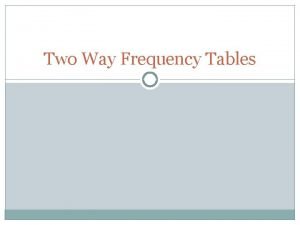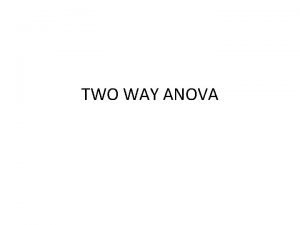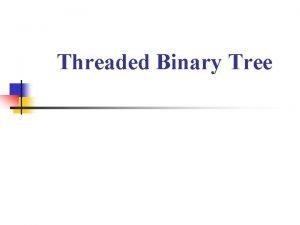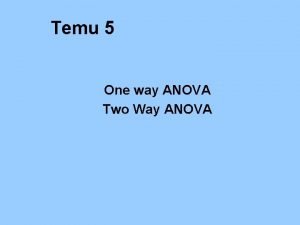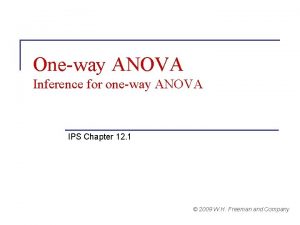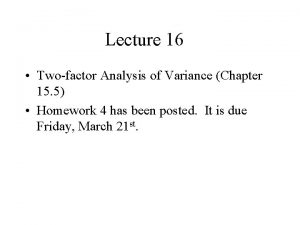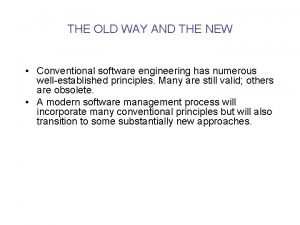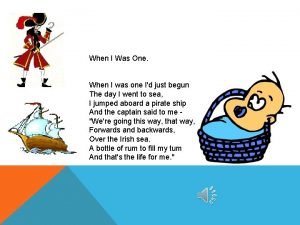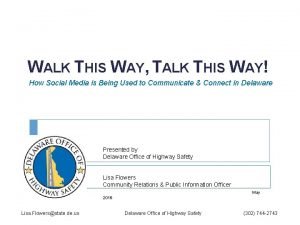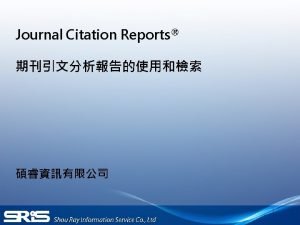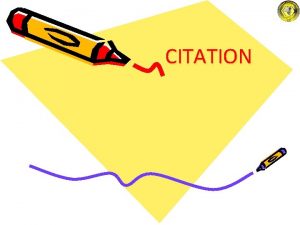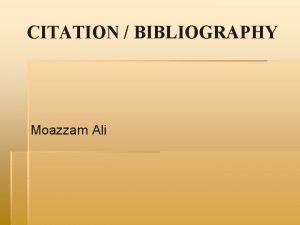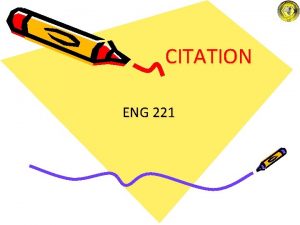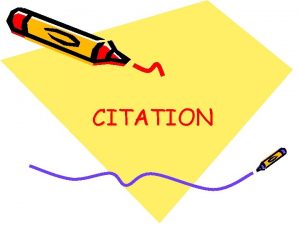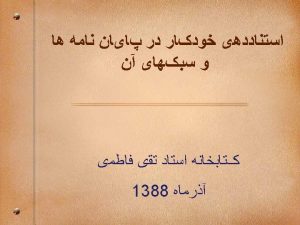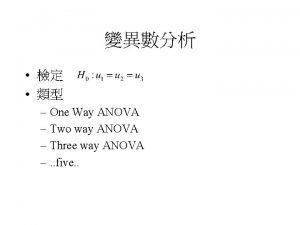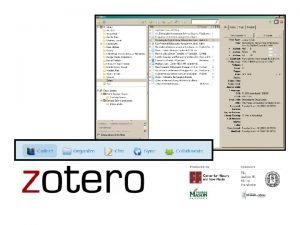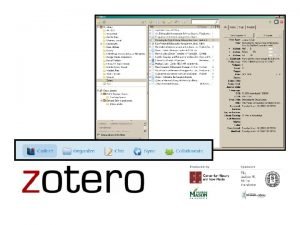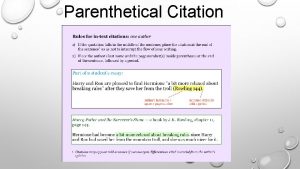Research Citation CITATION A citation is the way



![CITATION MEANS… ATTRIBUTION To attribute: (v. ) to regard [information in your paper] as CITATION MEANS… ATTRIBUTION To attribute: (v. ) to regard [information in your paper] as](https://slidetodoc.com/presentation_image_h2/505ef4fc0b427c60a4b6cc10878cbc7d/image-4.jpg)













- Slides: 17

Research Citation

CITATION A “citation” is the way you tell your readers that certain material in your work came from another source.

CITATION INVOLVES… • Documenting information • Giving credit to sources • Listing sources used • Providing “backup”
![CITATION MEANS ATTRIBUTION To attribute v to regard information in your paper as CITATION MEANS… ATTRIBUTION To attribute: (v. ) to regard [information in your paper] as](https://slidetodoc.com/presentation_image_h2/505ef4fc0b427c60a4b6cc10878cbc7d/image-4.jpg)
CITATION MEANS… ATTRIBUTION To attribute: (v. ) to regard [information in your paper] as - belonging (to), - produced (by), or - resulting (from)

WHY IS CITATION USEFUL TO THE READER OF RESEARCH? • To check up on the writer if the text seems unreliable • To do further reading if the topic is of interest • To find more sources for an assignment

WHY SHOULD I CITE? ? • Because it is the only way to use other people’s work without PLAGIARIZING

OTHER BENEFITS OF CITATION INCLUDE… • It shows the amount of research you’ve done. • It strengthens your work by lending outside support to your ideas.

WHEN DO I NEED TO CITE? Whenever… – you use direct quotations – you paraphrase – you use an idea that someone else has already expressed – you make specific reference to the work of another – someone else’s work has been critical in developing your ideas.

WHEN DON’T I NEED TO CITE? Whenever what you are writing is considered common knowledge: – JFK was assassinated in Dallas, TX – The Declaration of Independence was signed July 4, 1776 – Smoking causes lung cancer

WHAT DOES A CITATION PROVIDE TO MY READER? Citations give your readers the information necessary to find that source again… – author – title of work – name and location of publisher – date published – page numbers

WHAT TWO RESOURCES MUST I PROVIDE AS CITATION? – Works Cited List • aka bibliography • Separate document from your research paper – In-text Citation • Included in the body of your research paper The IN-TEXT CITATION provides a CROSSREFERENCE to your WORKS CITED LIST.

HOW WILL CITE MY SOURCES? You will create a Works Cited page as an appendix to your research paper. Works Cited Author (s) Title of Article Lappé, Anna, and Frances Moore Lappé. "The Genius of Wangari Maathai. " Mother Earth News Apr. -May 2005: 20 -21. Master. FILE Premier. Web. 27 Nov. 2012. Page #(s) Name of Database Publication Medium Access date Date Name of Publication

HOW DO I CITE IN THE TEXT OF MY PAPER? Using a parenthetical citation or a signal phrase. Parenthetical citation is a brief individual source reference in parentheses that appears in the body of the text as needed Signal phrase names the source (author or publication) within the body of the sentence containing borrowed material

WHAT DOES A STANDARD PARENTHETICAL CITATION LOOK LIKE? Wangari Maathai’s anti-deforestation Green Belt Movement grew from a 1977 Earth Day celebration of Kenya’s female environmental leaders. Maathai planted seven trees that day, and this small act led her to the notion that women of Kenyan villages could be recruited as tree planters (Lappé and Lappé 20).

WHAT DOES A SIGNAL PHRASE LOOK LIKE? According to Lappé and Lappé, Wangari Maathai’s anti-deforestation Green Belt Movement grew from a 1977 Earth Day celebration of Kenya’s female environmental leaders. Maathai planted seven trees that day, and this small act led her to the notion that women of Kenyan villages could be recruited as tree planters (20).

More to Come!

WHAT DOES A STANDARD PARENTHETICAL CITATION LOOK LIKE? Advances in prosthetic technology have enabled amputees to function like someone who hasn’t lost a limb. The C-leg’s hydraulic system recreates the motion of natural stepping through specialized sensors and microprocessors (Marriott A 3).
 Marginal frequency
Marginal frequency Two way anova
Two way anova What are the advantages of a threaded binary tree?
What are the advantages of a threaded binary tree? Perbedaan anova one way dan two way
Perbedaan anova one way dan two way One-way anova hypothesis testing
One-way anova hypothesis testing One way anova vs two way anova
One way anova vs two way anova Two way anova
Two way anova Conventional software engineering
Conventional software engineering Bottle of rum to fill my tum
Bottle of rum to fill my tum Talk this way
Talk this way Hình ảnh bộ gõ cơ thể búng tay
Hình ảnh bộ gõ cơ thể búng tay Slidetodoc
Slidetodoc Bổ thể
Bổ thể Tỉ lệ cơ thể trẻ em
Tỉ lệ cơ thể trẻ em Voi kéo gỗ như thế nào
Voi kéo gỗ như thế nào Glasgow thang điểm
Glasgow thang điểm Chúa yêu trần thế
Chúa yêu trần thế Các môn thể thao bắt đầu bằng tiếng nhảy
Các môn thể thao bắt đầu bằng tiếng nhảy
